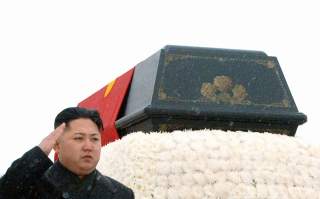Kim Is Not Denuclearizing Quickly—What Did Trump Expect?
President Trump needs to condition himself for an unhappy ending.
Flying back to Washington, DC on June 13, President Donald Trump was in high spirits. He returned from a historically unprecedented face-to-face encounter with North Korean leader Kim Jong-un—a meeting that was televised around the world—with a denuclearization agreement in hand. It was the beginning of a diplomatic achievement that none of his predecessors were able to reach: the conversion of the Hermit Kingdom from nuclear outlaw to a normal, non-nuclear member of the international community. “There is no longer a Nuclear Threat from North Korea,” Trump tweeted upon disembarking from Air Force One. “Meeting with Kim Jong Un was an interesting and very positive experience. North Korea has great potential for the future.”
Since the summit with Kim, Trump hasn’t changed his tune in public. Whether at the start of cabinet meetings in the White House or during press conferences with foreign leaders, he has continued to talk about progress being made in the talks with the North Koreans. Some of his comments have been so over-the-top (“All over Asia, they’re in love with the United States because of what we’ve done”) that it would appear from the surface that the President is trying to convince himself that the negotiations are “going very, very well.”
The reality, of course, differs from Trump’s salesmanship. Denuclearization talks with the Kim regime are not going well. In fact, the phrase “not going well” is probably the best positive spin you can put on it. Anyone who understands North Korea’s negotiating tactics, its history, and the sacred importance the country places on its nuclear weapons program could have predicted this from the very beginning. According to the Washington Post, Trump is just coming around to the realization that Kim Jong-un is not too keen on the complete, verifiable, and irreversible dismantlement (CVID) position that has been an American staple since North Korea’s nuclear activity grew into a global concern.
While Trump is putting up a confident front in public that everything with North Korea will work out just fine, he is reportedly incensed in private that progress has been so slow (or nonexistent in the view of many). One can surely empathize with Trump’s frustration; presidents as far back as George H. W. Bush have experienced the same feeling of disappointment and befuddlement. As any scholar of North Korea can attest, negotiating with Pyongyang on anything—let alone its prized nuclear deterrent—is about as pleasurable as going to the dentist for a root canal. Irascibility and obfuscation is a tried and true Kim regime strategy for dealing with Americans. Even a subject as simple as repatriating the remains of U.S. soldiers killed in the Korean War over a half-century ago takes haggling. What the Trump administration sees as a goodwill gesture by the North, Kim Jong-un’s negotiators view as one piece of leverage against the Americans. Just ask the American team who traveled to Panmunjom on July 12 to discuss the issue over American remains, only to be initially snubbed.
If Pyongyang is this hard-headed on the bones of American GI's, the prospect of a quick and smooth road to CVID is almost laughable in comparison. What did President Trump expect?
Diplomacy with the North Koreans is by no means dead in the water. While Secretary of State Mike Pompeo received a lot of flak for returning from his third trip to Pyongyang empty-handed, working-level discussions are occurring between both parties. The fact that officials in the State Department and the North Korean foreign ministry are talking is an achievement in and of itself. After all, less than six months ago the only words exchanged between Washington and Pyongyang were threats of annihilation. The temperature has gone down considerably since Kim Jong-un earlier in the year expressed an interest in dialogue with the United States and South Korea.
As far as denuclearization talks go, President Trump needs to condition himself for an unhappy ending. Pledges on a piece of paper aside, North Korea is no closer to CVID than it was a week, month, or a year ago. And while many American, South Korean, and Japanese officials will find this hard to comprehend, for Pyongyang to trade its nuclear umbrella for American assurances of economic investment, diplomatic normalization, and a peace treaty would be geopolitical stupidity. Libya’s Muammar al-Qaddafi took the same deal in 2003–2004, only to be overthrown by an American and NATO-backed rebellion less than eight years later.
If Trump wants to save the diplomatic momentum he helped spark with his daring visit to Singapore last month, he better task his national security advisers to draw up a Plan B. Official Washington may be frightened to state it openly, but CVID is a fairytale at this stage in North Korea's nuclear development. A more traditional approach combining arms control; a strong and permanent IAEA verification and monitoring regiment; constant and durable channels of communication at the senior and working levels; and deterrence is likely the best Trump can get. The good news is that compared to the other options—military force, a watered-down maximum-pressure campaign, and unrestricted North Korean proliferation—arms control is the most appetizing item on the table.
Daniel R. DePetris is a fellow at Defense Priorities. He is also a contributor to multiple publications, including CNN, The Diplomat, The American Conservative, and many others.
Image: North Korea's new leader Kim Jong-un salutes as he accompanies the hearse carrying the coffin of late North Korean leader Kim Jong-il during his funeral procession in Pyongyang in this photo taken by Kyodo December 28, 2011. North Korea's military staged a huge funeral procession on Wednesday in the snowy streets of the capital Pyongyang for its deceased "dear leader," Kim Jong-il, readying a transition to his son, Kim Jong-un. Ri Yong-ho, Chief of General Staff of the Korea People's Army, salutes on the right. Mandatory Credit REUTERS/Kyodo

